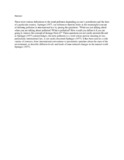| dc.description.abstract | There exist various definitions to the word pollution depending on one’s jurisdiction and the laws of a particular country. Springer (1977, see references therein) looks at the meaningful concept of defining pollution in international law by posing the questions: “What are you talking about when you are talking about pollution? What is pollution? How would you define it if you are going to remove the concept of damage from it?” These questions are not easily answerable and as Springer (1977) acknowledges, the term pollution is a word whose precise meaning in law, particularly international law, is not easily discerned Springer (1977). It has been used in a wide variety of contexts, from international conventions to pessimistic speeches about the state of the environment, to describe different levels and kinds of man-induced changes in the natural world Springer (1977). | en_US |

